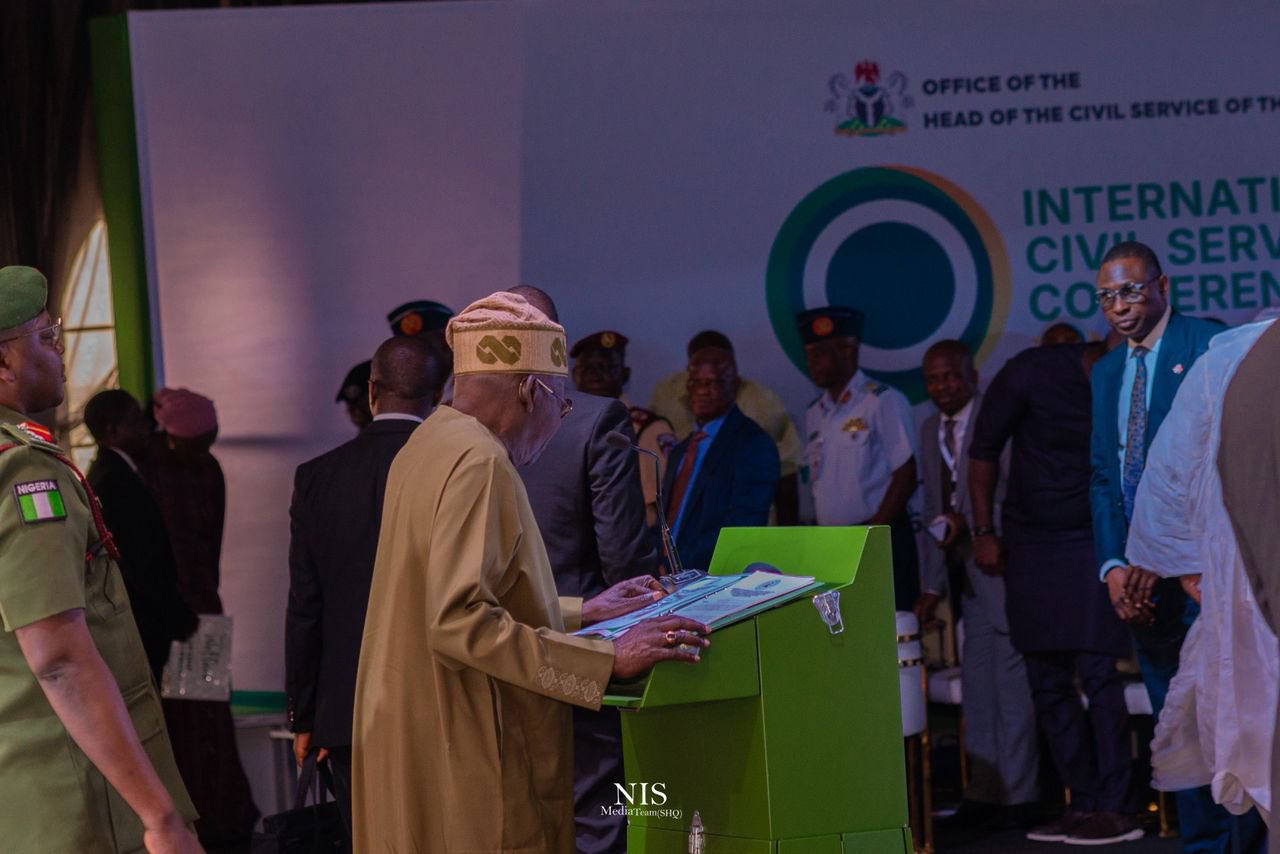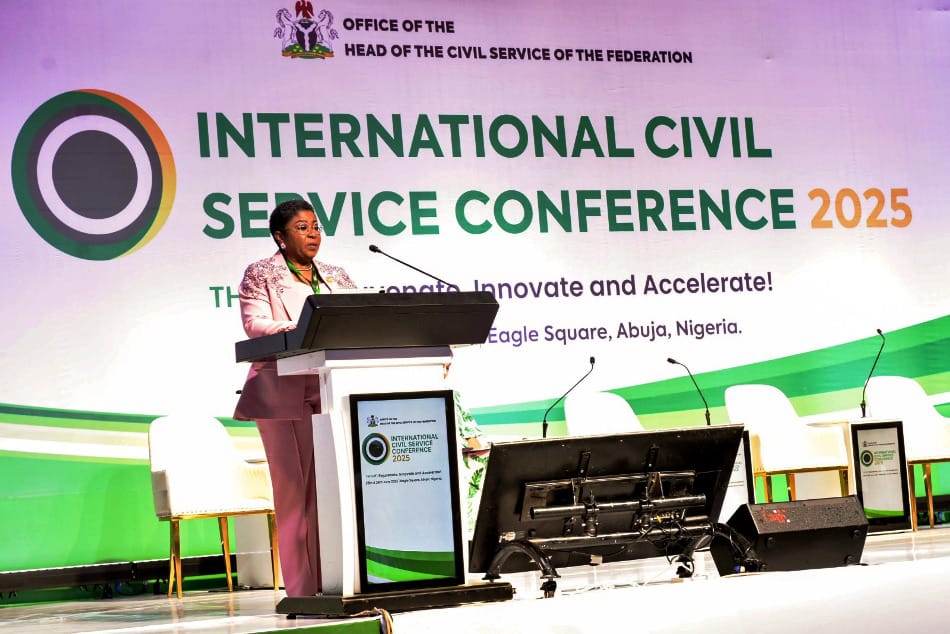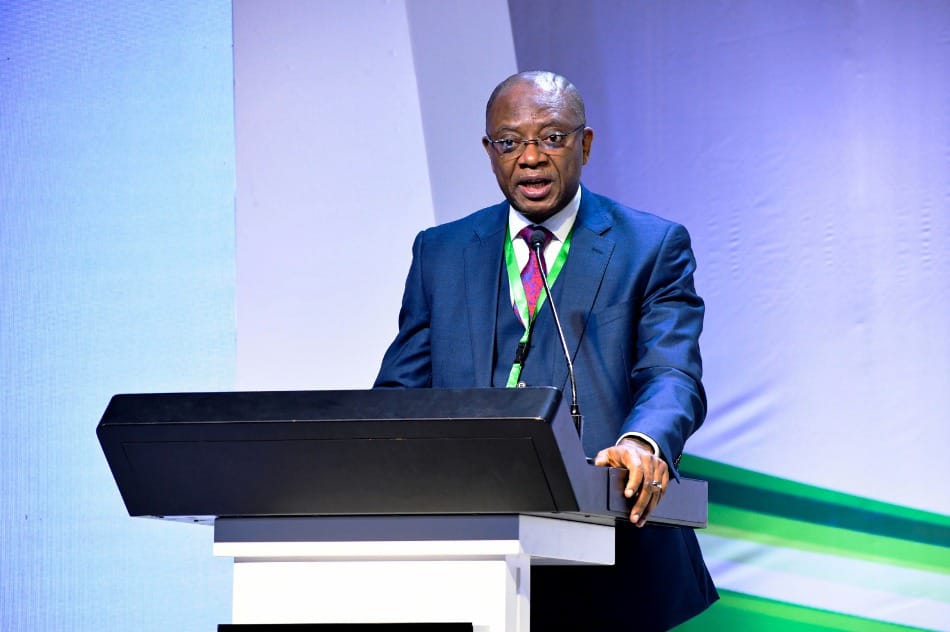…over 5,000 delegates, bold reforms, AI innovation mark new era for civil service
Ebere Ndukwu
More than 5,000 civil servants, policy leaders, and international experts gathered at the Eagle Square, Abuja, from Wednesday, June 25 to Thursday, June 26, for the first-ever International Civil Service Conference, a landmark event that set the stage for a new era of bold reforms, digital transformation, and global partnerships for Nigeria’s public sector.
Hosted by the Head of the Civil Service of the Federation, Dr. Didi Esther Walson-Jack, OON, mni, in partnership with the Global Government Forum (UK), the two-day event signalled a dramatic shift from bureaucratic inertia to dynamic, accountable, and citizen-focused governance under the theme: “Rejuvenate, Innovate, Accelerate!”

President Bola Ahmed Tinubu, who spoke the last day of the conference, described the Nigerian Civil Service as the “engine of the Renewed Hope Agenda” and ordered a comprehensive personnel audit and skills gap analysis across all federal institutions.
“We can only guarantee the high-performance culture our country deserves by placing the right people in the right roles,” Tinubu said.
He called on Ministries, Departments, and Agencies (MDAs) to prioritise data integrity, digitisation, and AI integration, noting that innovation was no longer a choice but an obligation in today’s rapidly evolving governance landscape.
“This is a Declaration of Action” — Walson-Jack

The Head of the Civil Service of the Federation, Dr. Didi Esther Walson-Jack, who spearheaded the historic conference, described the gathering as a bold call to move from rhetoric to measurable reforms.
In her keynote address, she stated:
“The systems we inherited were built for a different era. We now face 21st-century challenges—urbanisation, climate shocks, pandemics, and rising demands for inclusion. The era of ‘business as usual’ is over.”
She emphasised the need to rejuvenate the spirit, structure, and skills of the civil service, by attracting young talent, promoting inclusivity, and embracing performance-based practices.
Walson-Jack added that the conference is not just a learning event, but a “catalyst for real-world action,” with strategic Memorandums of Understanding signed, bilateral collaborations forged, and new technologies unveiled.
Youth Voices and AI-Powered Transformation
A defining feature of the conference was the Aspire Stage, where young civil servants showcased innovative solutions for modern governance. Walson-Jack said their voices were not only heard but were “essential for the future of public service.”
One of the major innovations launched at the conference was “Service-Wise GPT,” an AI-powered digital assistant developed by the Office of the Head of Civil Service. The tool helps public servants and citizens quickly access rules, circulars, and policies.
“This is a game-changer,” she said. “It reduces bottlenecks, empowers quick decision-making, and enhances transparency.”
Dr. Joe Abah: “Stop Treating Civil Servants as Nuisance”

Delivering one of the most pointed speeches, Dr. Joe Abah, Vice President and Country Director of DAI Nigeria, called for a shift in how politicians engage with the civil service.
“If politicians continue to treat civil servants as inconvenient nuisances, they’ll pay them poorly, and nothing will change,” Abah warned.
He urged political leaders to recognise public servants as drivers of policy and national growth, not obstacles to reform.
Digital Backbone, Global Partnerships
The conference served as a stocktaking moment for the ongoing Federal Civil Service Strategy and Implementation Plan 2021–2025 (FCSSIP25). Experts from across Africa, Europe, and Asia joined local reformers in roundtables, workshops, and strategy labs aimed at accelerating reform outcomes.
Galaxy Backbone, Nigeria’s government IT infrastructure agency, was highlighted as a key enabler in the full digitalisation of government services by December 2025.
President Tinubu also revealed that a Memorandum of Understanding with the United Nations Development Programme (UNDP) had been signed to transform the Public Service Institute of Nigeria into a global centre of excellence.
Renewed Hope for Civil Servants
In a final affirmation of support, Tinubu cited ongoing efforts to enhance welfare packages, including the new minimum wage, salary adjustments, and the implementation of the Pension Bond Scheme. These policies, he said, reflect his administration’s appreciation of the sacrifices made by public servants.
“Our civil service must embrace innovation not as an option, but as a duty. The time to act is now,” the President declared.
The Road Ahead
In her closing remarks, Walson-Jack vowed that her office would not rest until the reforms envisioned are implemented across all levels of government.
“We are not here to merely talk,” she said. “We are here to listen, to challenge respectfully, and to collaborate intentionally. We leave here renewed in our mission to build a public service that truly delivers.”
As the curtains fell on the Maiden International Civil Service Conference, the message was clear: Nigeria’s civil service is no longer looking back—it is marching forward, retooled, reimagined, and ready to lead.